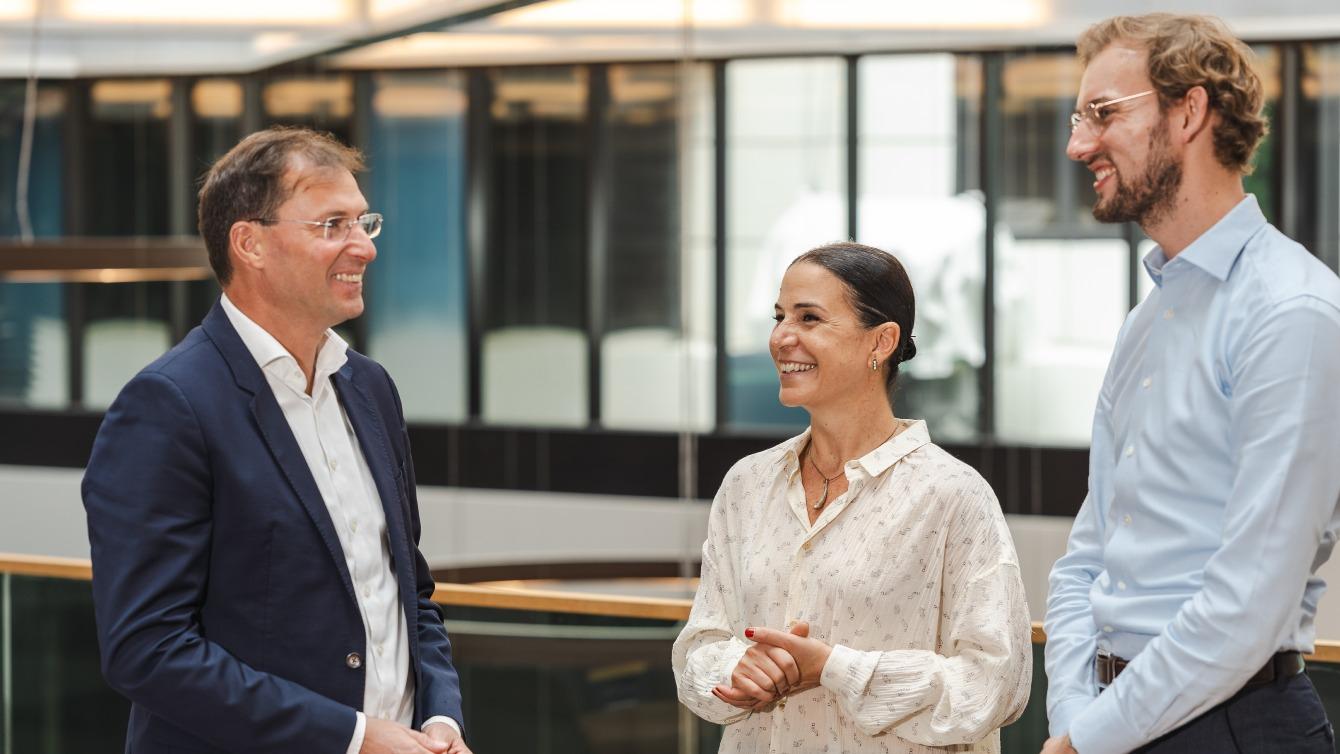
Industry
Energy, utilities & resources
Our role
Independent research into investment plans
Result
Clarity about contribution to public interest
Gasunie is planning to invest in a hydrogen transport network in Germany. Hydrogen can be effectively used as a raw material and fuel for industry and transportation, and is easy to store in large quantities. Director of business development Marc van der Linden sees such an infrastructure as a strong foundation for a future and sustainable hydrogen market for major industries in the Netherlands and Germany. PwC supported Gasunie with research into the concept behind these investment plans.
PwC partner Gülbahar Tezel and her team tested Gasunie’s idea against economic theories ‘to determine whether the investment in a hydrogen transport network could contribute to the Dutch public interest. This is vital as a strong societal foundation can contribute to public trust.’
Collaboration in transformation process
As a state-owned company, Gasunie manages and maintains the infrastructure for the large-scale transport and storage of gas in the Netherlands and Northern Germany. As a leading European energy infrastructure enterprise, with gas transport and storage as its core activities, how do the plans to invest in the hydrogen transport network fit within the company's strategy?
‘Our goal is to facilitate a sustainable liquid hydrogen market for the Netherlands and Western Europe,’ says Van der Linden, who believes that investing in hydrogen aligns well with Gasunie’s ambitions in terms of transformation. ‘The energy transition is essentially one large transformation process for the Netherlands. Gasunie is evolving from a natural gas company into an organisation that, in addition to natural gas, also wishes to invest in hydrogen, carbon capture and storage, and heat.’
This is a vision that fits seamlessly with how PwC helps organisations radically change the way they create, deliver and retain value. Using our ‘business model reinvention framework’ we collaborate closely with our clients to map out a plan that drives value creation and growth.
Developing a hydrogen network
As foreign investments by a state-owned company are often evaluated based on the public interest of the Netherlands, Gasunie asked PwC to carry out an independent assessment. PwC manager Rob Wessels, who was part of the research team, explains that the German government's plans to develop a hydrogen network, known as the ‘Kernnetz’, were the specific trigger for the study. ‘Gasunie already has a gas network in the Northwest of Germany which can be partially converted into a hydrogen infrastructure. The company had to make a preliminary decision on whether to participate in this ‘Kernnetz’ network and we evaluated the plan based on facts and economic theories.’
Van der Linden adds that, as industrial neighbours, the Netherlands and Germany are closely connected. ‘We can indeed make good use of the existing natural gas network in Germany, especially now we can no longer rely on the large gas field in Groningen. This used to be a source that made everyone wish to be connected with us, but the time has come for us to look for other opportunities and connections. The importation of hydrogen from the north provides a firm foundation.’
Hydrogen market is still work in progress
As an economist herself, Tezel admits that research using economic theory can be somewhat complex to explain. ‘In essence the theory provides conceptual tools which help us determine whether public ownership will contribute to the public interest. You could theoretically leave the interests to the market or set them out in a contract, for example by contracting a market party to build the infrastructure. However, with the hydrogen market being still very much a work in progress, all the public interests cannot be encapsulated in a contract. In jargon terms these are called non-contractible interests, and they are the reason we concluded the investment by Gasunie could contribute to the public interest.’
Van der Linden adds that this investment means Gasunie will also remove a barrier to establishing the hydrogen market. ‘Developing a hydrogen infrastructure requires collaboration between the government and various energy network companies. This is very important as it will provide greater certainty to the market.’
Challenges in developing a hydrogen market
While Gasunie’s hydrogen transport investment plans offer a promising and sustainable outlook, there are challenges ahead too. Van der Linden compares the mentioned lack of a real market for hydrogen to the classic chicken-and-egg dilemma. ‘If Gasunie doesn’t provide the infrastructure, the hydrogen market won’t take off. But without a market, investing in infrastructure brings a lot of uncertainties. We also face long preparation times and permit procedures in order to build the infrastructure. Starting on time will be crucial to stimulate market development.’
Tezel mentions the cost aspect as another significant challenge. ‘The production of green and blue hydrogen is expensive, which is why the Dutch government and European Commission are encouraging companies to use and produce more. Both the demand and the supply sides are being stimulated via the introduction of price incentives and standards and the granting of subsidies. As Marc said, investment in the infrastructure is crucial, but there must also be a demand for hydrogen to make these investments profitable.’
Van der Linden: ‘Our ultimate wish and requirement is to serve the Dutch public interest, and the question is how best to do that. As Gülbahar mentioned, we explored both the path of contracts and whether to take a seat at the table and make the investment ourselves. The latter path is what we now intend to follow.’
Trust and cooperation
Wessels adds that things moved quickly once Gasunie put the research request on the table. ‘We were in the starting blocks at the beginning of January and the first results followed soon after. Gasunie was very supportive of our research work, providing us with a specially equipped space at its headquarters in Groningen. Dubbed the “war room”, this was our base for contacts with the relevant Gasunie departments and experts. All expertise and knowledge we shared there was hugely valuable for the research report.’
‘We chose PwC for both its substantive expertise and sound insight into the decision-making process,’ concludes Van der Linden. ‘This was vital considering the various interests involved, including those of the board of directors, the supervisory board and the shareholders. Gülbahar Tezel’s team was able to really take all these into account during what was an exciting process for us. That is only possible when you speak the same language and can strike the right tone.’


















